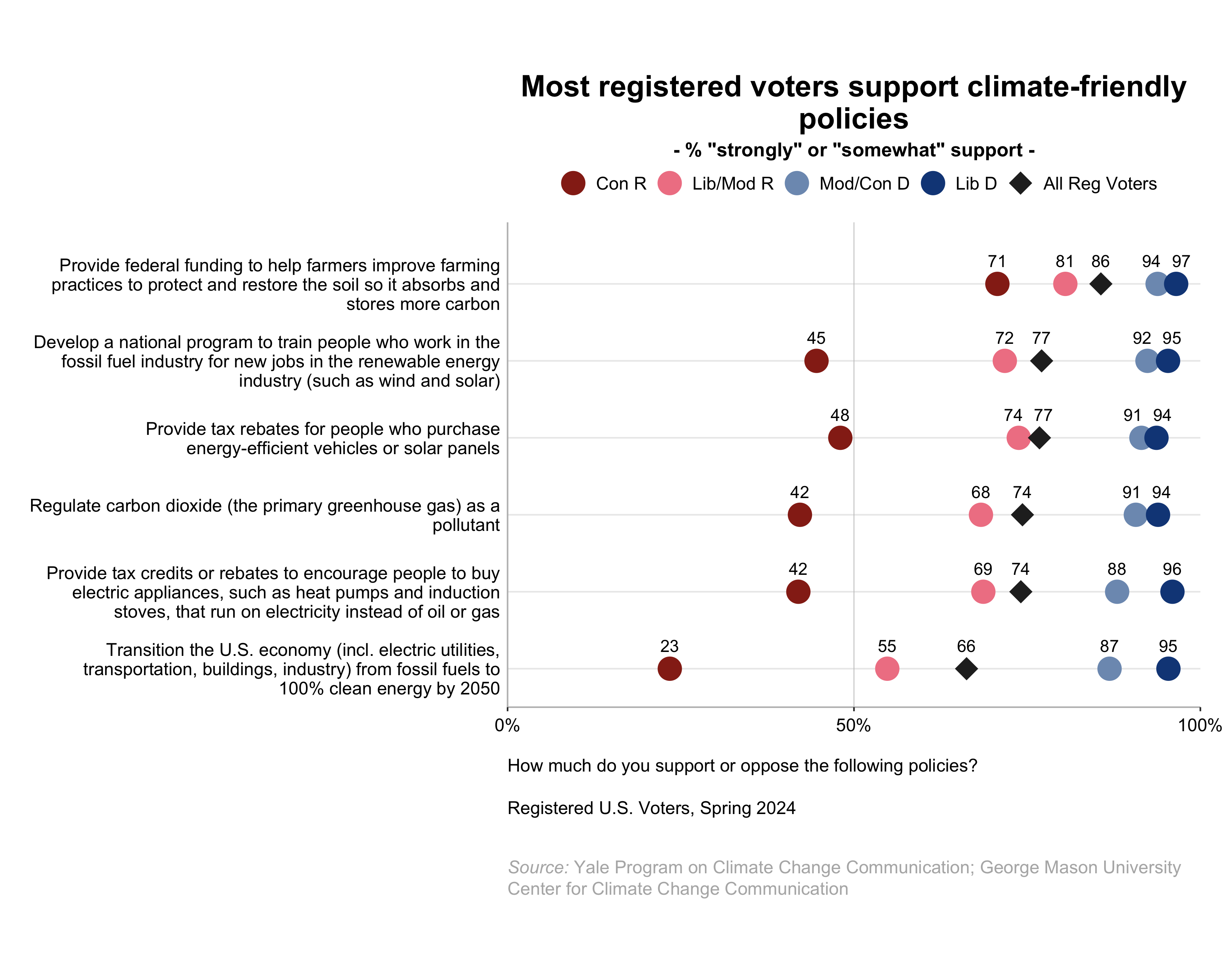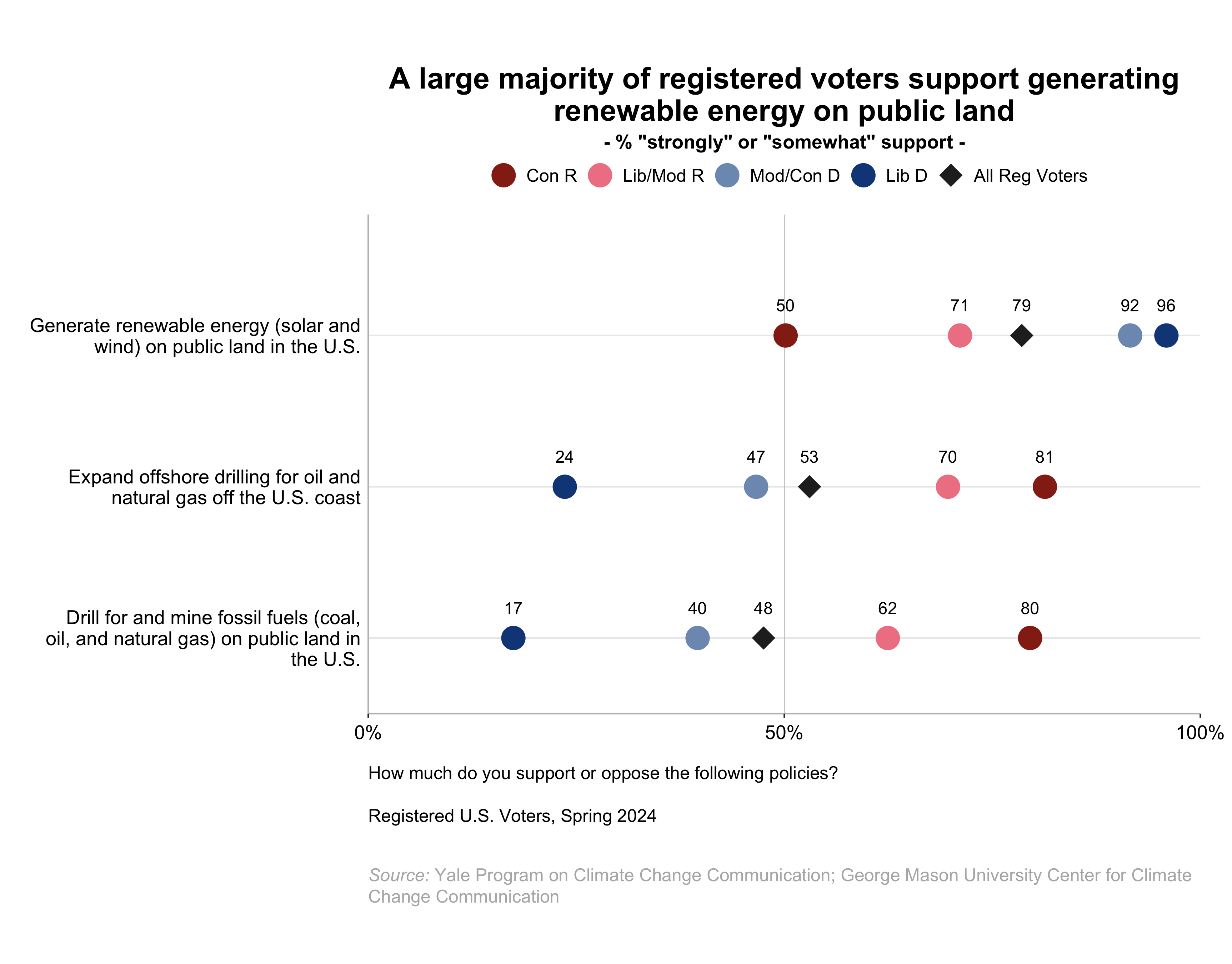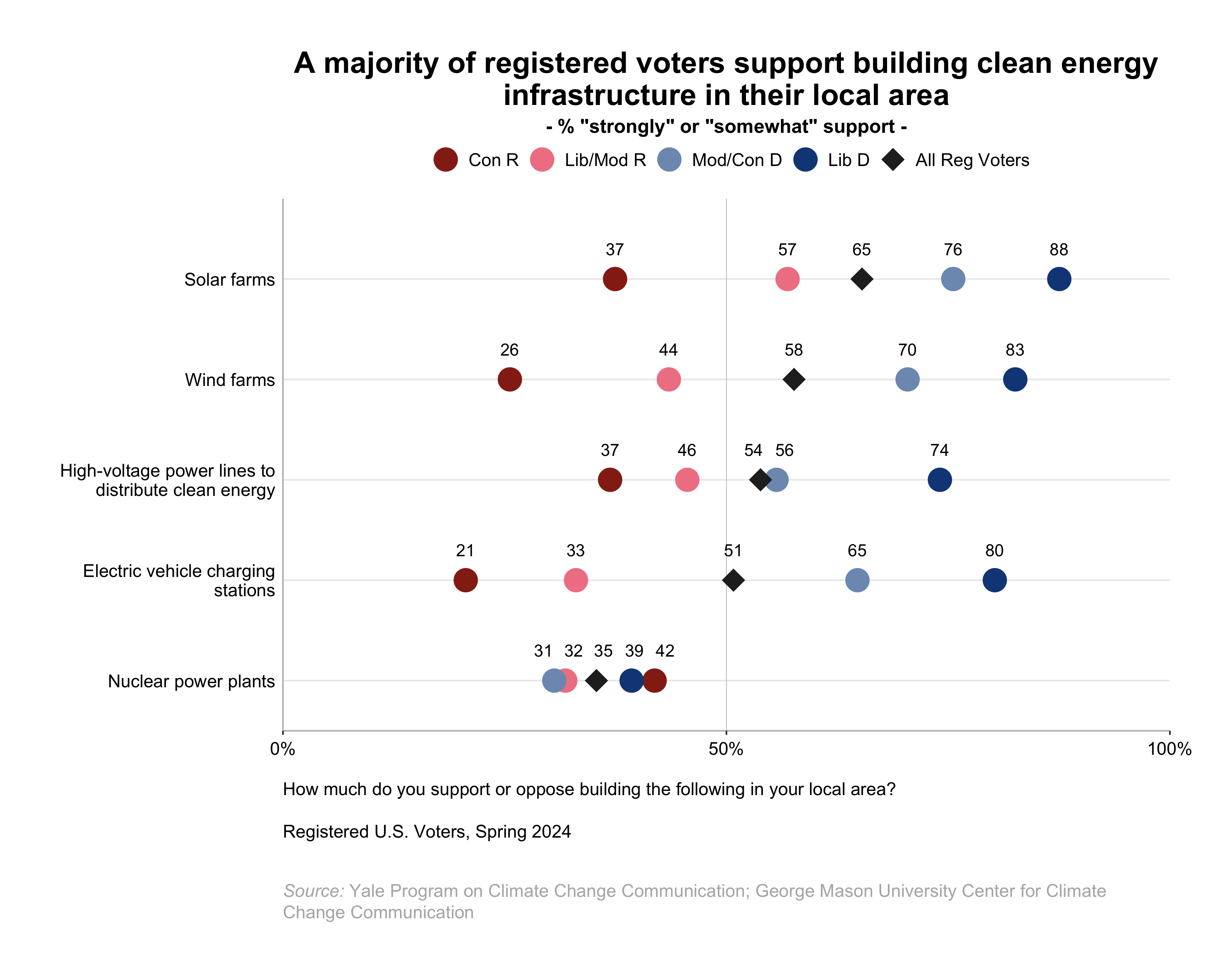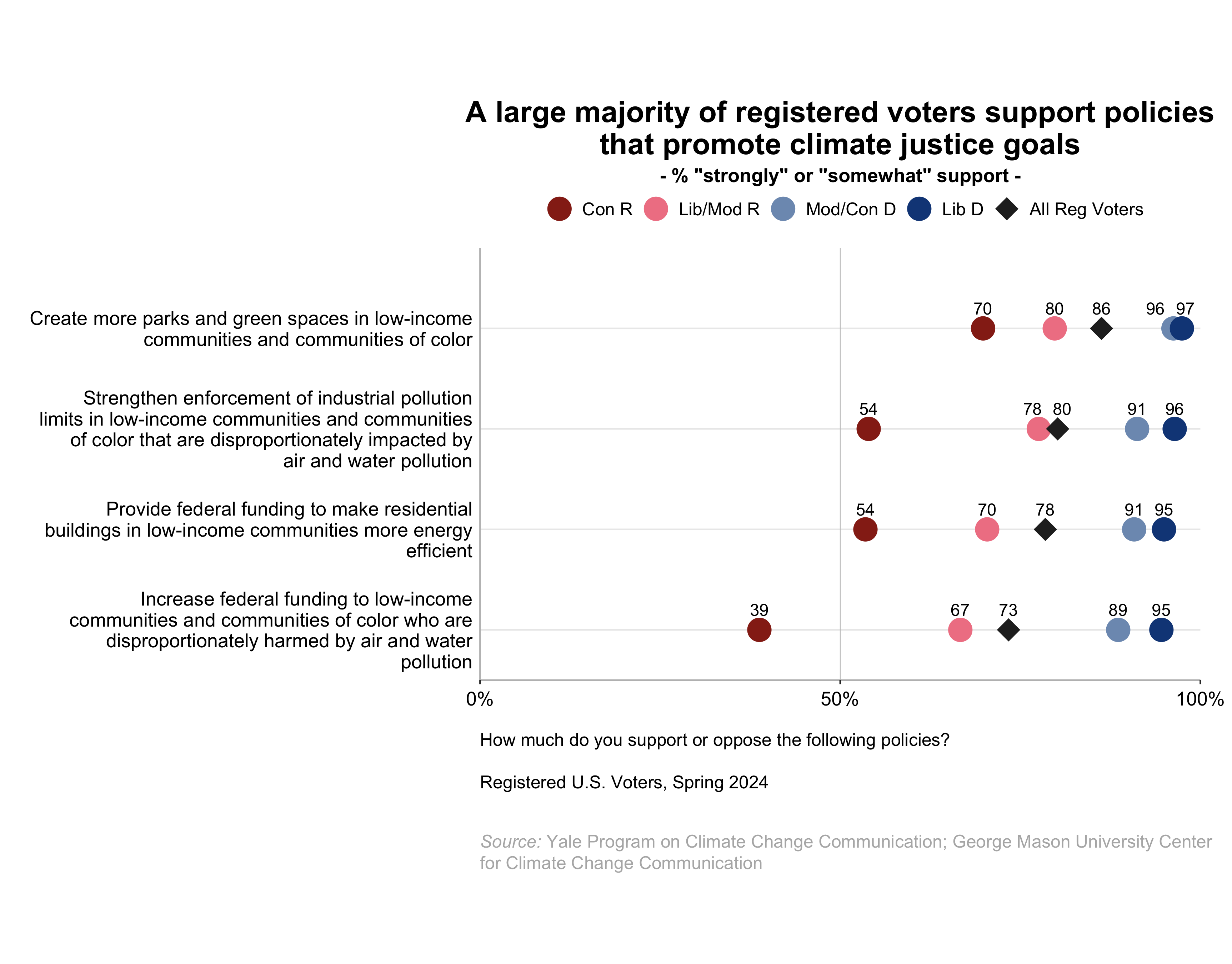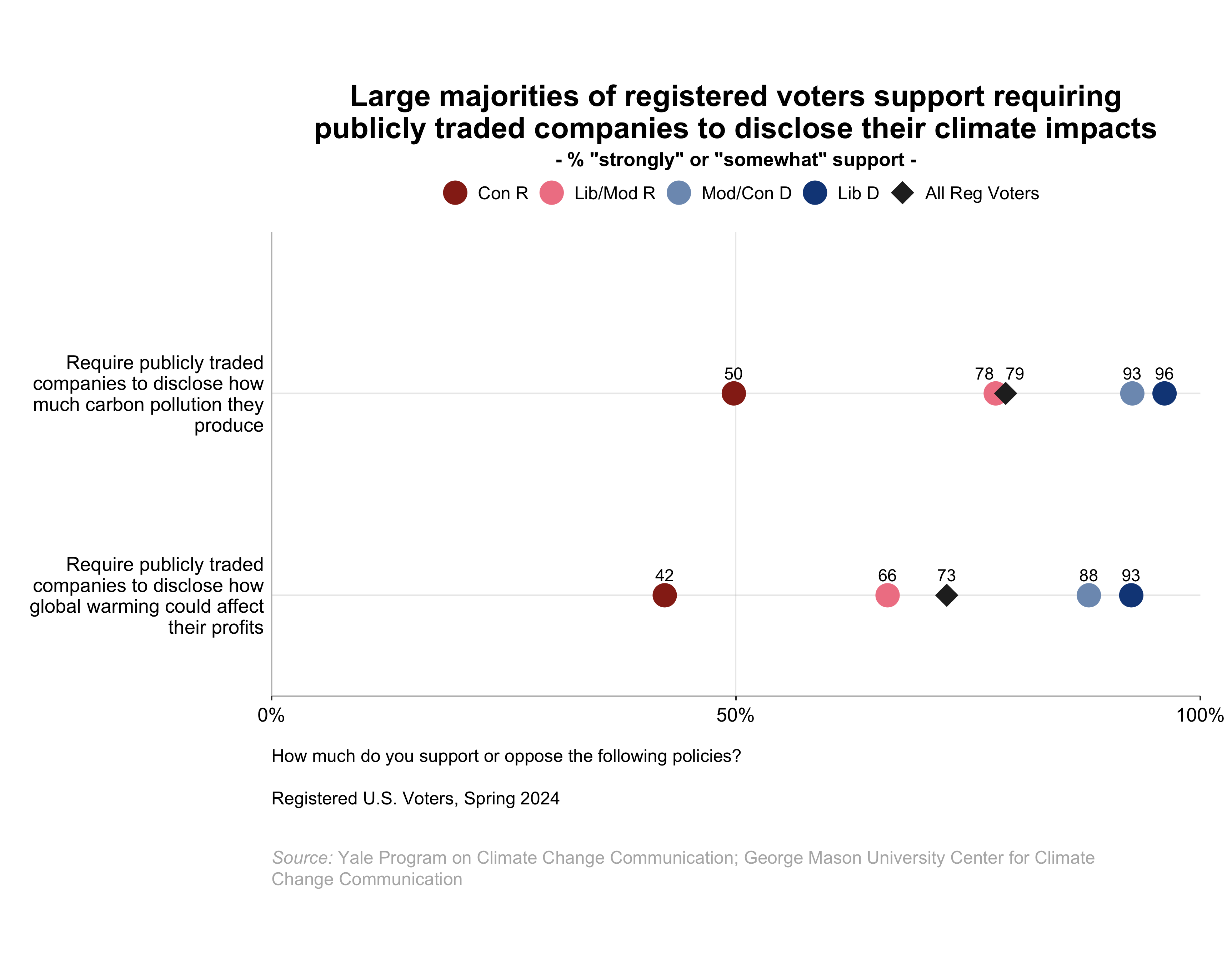Report · Jun 13, 2024
Climate Change in the American Mind: Politics & Policy, Spring 2024
By Anthony Leiserowitz, Edward Maibach, Seth Rosenthal, John Kotcher, Emily Goddard, Jennifer Carman, Matthew Ballew, Marija Verner, Teresa Myers, Jennifer Marlon, Sanguk Lee, Matthew Goldberg, Nicholas Badullovich and Kathryn Thier
Filed under: Policy & Politics
3. Support for Policies to Reduce the Pollution that Causes Global Warming
3.1. Most registered voters support climate-friendly policies.
Registered voters across the political spectrum support many energy policies designed to reduce carbon pollution and fossil fuel dependence and promote clean energy, including:
- Providing federal funding to help farmers improve practices to protect and restore the soil so it absorbs and stores more carbon: 86% of registered voters, including 97% of liberal Democrats, 94% of moderate/conservative Democrats, 81% of liberal/moderate Republicans, and 71% of conservative Republicans.
- Developing a national program to train people who work in the fossil fuel industry for new jobs in the renewable energy industry (such as wind and solar): 77% of registered voters, including 95% of liberal Democrats, 92% of moderate/conservative Democrats, 72% of liberal/moderate Republicans, and 45% of conservative Republicans.
- Providing tax rebates to people who purchase energy-efficient vehicles or solar panels: 77% of registered voters, including 94% of liberal Democrats, 91% of moderate/conservative Democrats, 74% of liberal/moderate Republicans, and 48% of conservative Republicans.
- Regulating carbon dioxide (the primary greenhouse gas) as a pollutant: 74% of registered voters, including 94% of liberal Democrats, 91% of moderate/conservative Democrats, 68% of liberal/moderate Republicans, and 42% of conservative Republicans.
- Providing tax credits or rebates to encourage people to buy electric appliances, such as heat pumps and induction stoves, that run on electricity instead of oil or gas: 74% of registered voters, including 96% of liberal Democrats, 88% of moderate/conservative Democrats, 69% of liberal/moderate Republicans, and 42% of conservative Republicans.
- Transitioning the U.S. economy (including electric utilities, transportation, buildings, and industry) from fossil fuels to 100% clean energy by 2050: 66% of registered voters, including 95% of liberal Democrats, 87% of moderate/conservative Democrats, 55% of liberal/moderate Republicans, and 23% of conservative Republicans.
3.2. A large majority of registered voters support generating renewable energy on public land.
A large majority of registered voters (79%) support generating renewable energy (solar and wind) on public land in the United States. This includes nearly all liberal Democrats (96%) and moderate/conservative Democrats (92%) as well as a large majority of liberal/moderate Republicans (71%) and half of conservative Republicans (50%).
Fewer registered voters support fossil-fuel production in the United States, including:
- Expanding offshore drilling for oil and natural gas off the U.S. coast: 53% of registered voters; 81% of conservative Republicans, 70% of liberal/moderate Republicans, 47% of moderate/conservative Democrats, and 24% of liberal Democrats.
- Drilling for and mining fossil fuels (coal, oil, and natural gas) on public land in the U.S.: 48% of registered voters; 80% of conservative Republicans, 62% of liberal/moderate Republicans, 40% of moderate/conservative Democrats, and 17% of liberal Democrats.
3.3. A majority of registered voters support building clean energy infrastructure in their local area.
Majorities of registered voters support climate-friendly energy production and distribution infrastructure in their local area, including solar farms (65%), wind farms (58%), high-voltage power lines to distribute clean energy (54%), and electric vehicle charging stations (51%). These include majorities of liberal Democrats and moderate/conservative Democrats, and many liberal/moderate Republicans, but fewer conservative Republicans:
- Solar farms: liberal Democrats, 88%; moderate/conservative Democrats, 76%; liberal/moderate Republicans, 57%; conservative Republicans, 37%.
- Wind farms: liberal Democrats, 83%; moderate/conservative Democrats, 70%; liberal/moderate Republicans, 44%; conservative Republicans, 26%.
- High-voltage power lines to distribute clean energy: liberal Democrats, 74%; moderate/conservative Democrats, 56%; liberal/moderate Republicans, 46%; conservative Republicans, 37%.
- Electric vehicle charging stations: liberal Democrats, 80%; moderate/conservative Democrats, 65%; liberal/moderate Republicans, 33%; conservative Republicans, 21%.
Fewer registered voters support building nuclear power plants in their local area (35%), including 42% of conservative Republicans, 39% of liberal Democrats, 32% of liberal/moderate Republicans, and 31% of moderate/conservative Democrats.
3.4. A large majority of registered voters support policies that promote climate justice goals.
A large majority of registered voters across the political spectrum support a variety of policies that promote climate justice goals, including the following:
- Creating more parks and green spaces in low-income communities and communities of color: 86% of registered voters, including 97% of liberal Democrats, 96% of moderate/conservative Democrats, 80% of liberal/moderate Republicans, and 70% of conservative Republicans.
- Strengthening enforcement of industrial pollution limits in low-income communities and communities of color that are disproportionately impacted by air and water pollution: 80% of registered voters, including 96% of liberal Democrats, 91% of moderate/conservative Democrats, 78% of liberal/moderate Republicans, and 54% of conservative Republicans.
- Providing federal funding to make buildings in low-income communities more energy efficient: 78% of registered voters, including 95% of liberal Democrats, 91% of moderate/conservative Democrats, 70% of liberal/moderate Republicans, and 54% of conservative Republicans.
- Increasing federal funding to low-income communities and communities of color who are disproportionately impacted by air and water pollution: 73% of registered voters, including 95% of liberal Democrats, 89% of moderate/conservative Democrats, 67% of liberal/moderate Republicans, and 39% of conservative Republicans.
3.5. Large majorities of registered voters support requiring publicly traded companies to disclose their climate impacts.
Large majorities of registered voters across the political spectrum support policies to require publicly traded companies to disclose their climate impacts by doing the following:
- Disclosing how much carbon pollution they produce: 79% of registered voters, including 96% of liberal Democrats, 93% of moderate/conservative Democrats, 78% of liberal/moderate Republicans, and 50% of conservative Republicans.
- Disclosing how global warming could affect their profits: 73% of registered voters, including 93% of liberal Democrats, 88% of moderate/conservative Democrats, 66% of liberal/moderate Republicans, and 42% of conservative Republicans.
